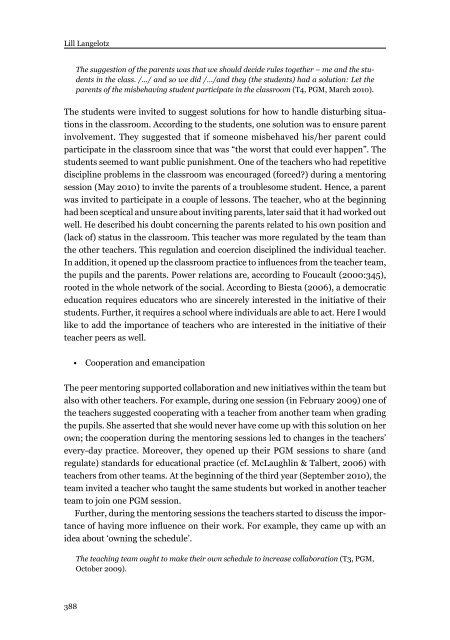Download issue - Umeå universitet
Download issue - Umeå universitet
Download issue - Umeå universitet
Create successful ePaper yourself
Turn your PDF publications into a flip-book with our unique Google optimized e-Paper software.
Lill Langelotz<br />
The suggestion of the parents was that we should decide rules together – me and the students<br />
in the class. /…/ and so we did /…/and they (the students) had a solution: Let the<br />
parents of the misbehaving student participate in the classroom (T4, PGM, March 2010).<br />
The students were invited to suggest solutions for how to handle disturbing situations<br />
in the classroom. According to the students, one solution was to ensure parent<br />
involvement. They suggested that if someone misbehaved his/her parent could<br />
participate in the classroom since that was “the worst that could ever happen”. The<br />
students seemed to want public punishment. One of the teachers who had repetitive<br />
discipline problems in the classroom was encouraged (forced?) during a mentoring<br />
session (May 2010) to invite the parents of a troublesome student. Hence, a parent<br />
was invited to participate in a couple of lessons. The teacher, who at the beginning<br />
had been sceptical and unsure about inviting parents, later said that it had worked out<br />
well. He described his doubt concerning the parents related to his own position and<br />
(lack of) status in the classroom. This teacher was more regulated by the team than<br />
the other teachers. This regulation and coercion disciplined the individual teacher.<br />
In addition, it opened up the classroom practice to influences from the teacher team,<br />
the pupils and the parents. Power relations are, according to Foucault (2000:345),<br />
rooted in the whole network of the social. According to Biesta (2006), a democratic<br />
education requires educators who are sincerely interested in the initiative of their<br />
students. Further, it requires a school where individuals are able to act. Here I would<br />
like to add the importance of teachers who are interested in the initiative of their<br />
teacher peers as well.<br />
• Cooperation and emancipation<br />
The peer mentoring supported collaboration and new initiatives within the team but<br />
also with other teachers. For example, during one session (in February 2009) one of<br />
the teachers suggested cooperating with a teacher from another team when grading<br />
the pupils. She asserted that she would never have come up with this solution on her<br />
own; the cooperation during the mentoring sessions led to changes in the teachers’<br />
every-day practice. Moreover, they opened up their PGM sessions to share (and<br />
regulate) standards for educational practice (cf. McLaughlin & Talbert, 2006) with<br />
teachers from other teams. At the beginning of the third year (September 2010), the<br />
team invited a teacher who taught the same students but worked in another teacher<br />
team to join one PGM session.<br />
Further, during the mentoring sessions the teachers started to discuss the importance<br />
of having more influence on their work. For example, they came up with an<br />
idea about ‘owning the schedule’.<br />
The teaching team ought to make their own schedule to increase collaboration (T3, PGM,<br />
October 2009).<br />
388

















